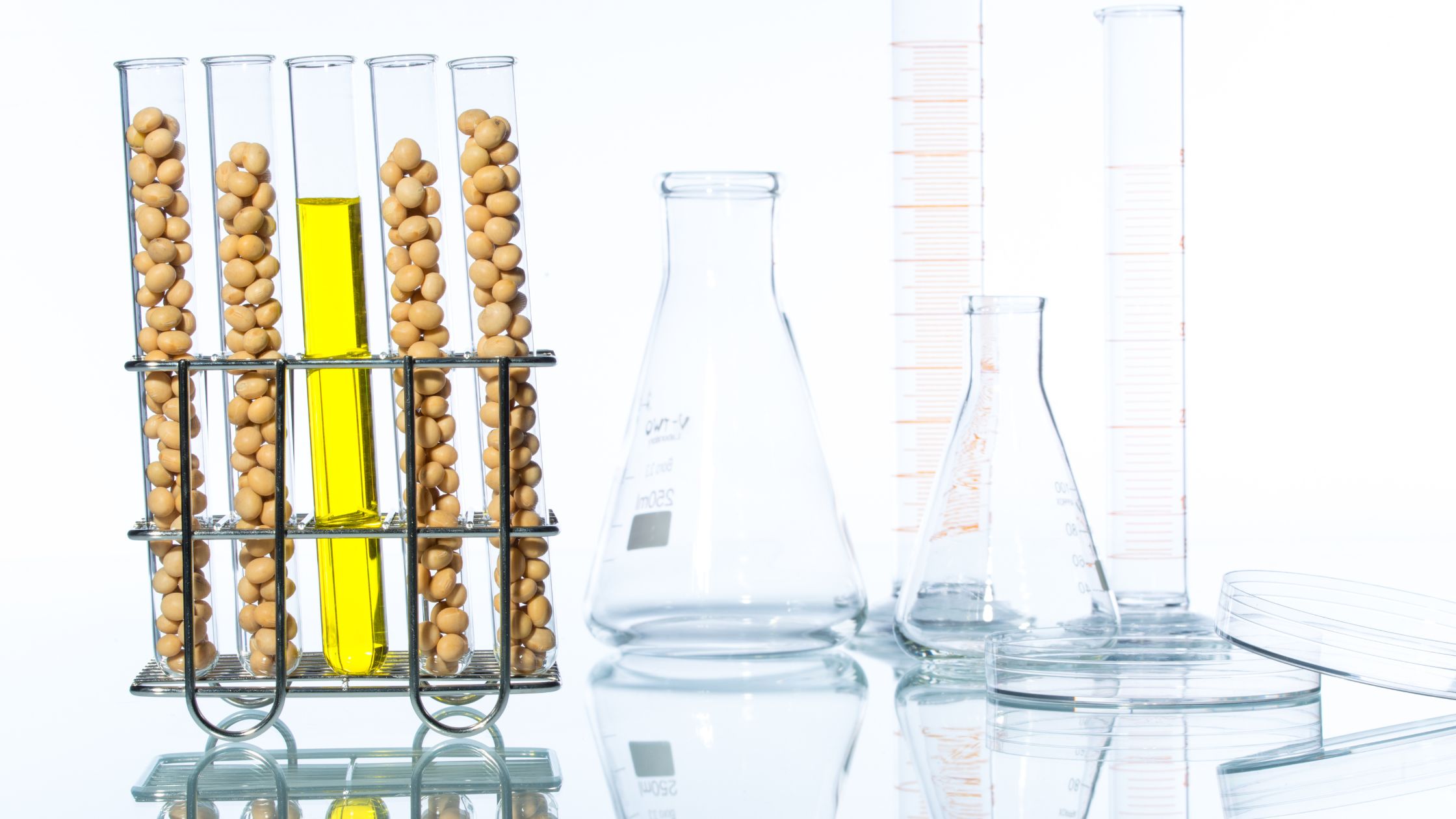Soy, a versatile ingredient in food processing, appears in numerous products found on grocery store shelves. Despite being touted as a high protein, heart-healthy food, there are valid concerns about its overall impact on human health and the environment.
What is soy?
When reading a food label, it’s important to remember the many, many places soy can appear in food. Here are some of the most common uses:
- tempeh
- edamame
- soy sauce
- tamari
- tofu
- soy flour
- TVP (texturized vegetable protein)
- soy grits
- soy milk
- soy isoflavones
- isolated soy protein
- natto (fermented soy)
- soy lecithin
- hydrolyzed soy protein
Where Did Soy Come From?
Soybeans, originally from China, made their way to the United States in the early 1700s, initially used as a nitrogen source and fertilizer for other crops like corn. At that time, they were not grown for human consumption.
However, it was later discovered that soybeans contained protein, and they were incorporated into animal feed. Farmers noticed that it made the animals grow fatter, leading to an increase in its usage in animal feed.
As soy production for animal feed expanded, there was an excess of soybeans that needed to be utilized. People began consuming them, and soybean oil became a popular product. Over time, soybeans became a prevalent ingredient in the American diet due to their incorporation into various processed foods like meat alternatives, salad dressings, fast food, and baked goods.
In contrast to the US, in China and other parts of Asia, soy is primarily consumed as a fermented food. Fermented soy products like soy sauce, miso, chunjang, and natto are commonly used in Asian cuisine. The Asians also do not consume as much processed soy as in the US, where it has been turned into a wide array of products.
The Health Challenges of Genetically Modified Soy
One of the most significant concerns regarding soy consumption in the United States is that over 90% of it is genetically modified. This genetic modification is primarily aimed at making soybeans resistant to Roundup, an herbicide containing glyphosate.
Consequently, genetically modified soy often contains high levels of glyphosate residue, posing potential health risks.
One of the issues with genetically modified soy is its phytoestrogenic status. Consuming soy introduces plant hormones called phytoestrogens into our bodies, which can have various effects on hormone balance.
Additionally, the processing of soybeans further compounds the problem. Many beneficial nutrients present in soy do not survive the processing, leaving behind a chemical cocktail of nutrient analogues, which may not provide the same health benefits as the original nutrients.
Moreover, soy contains antinutrients that can potentially lead to digestive issues. Animal studies suggest that these antinutrients may interfere with the gut lining, causing inflammation and digestive discomfort.
For individuals with underactive thyroid (hypothyroidism), soy consumption may worsen the condition, as soy can interfere with thyroid function. Furthermore, soy contains large amounts of oxalates, which can be problematic for individuals prone to kidney stones formed from oxalates.
The environmental impact of genetically modified soy is also concerning. The widespread use of Roundup to control weeds in genetically modified soybean fields has led to the development of superweeds, causing ecological imbalances.
Moreover, glyphosate, the key component of Roundup, acts as a chelator, binding to minerals in the soil and rendering them unavailable to the plants. As a result, soybeans grown in such soil may lack essential minerals, leading to nutritionally deficient plants. Glyphosate's negative impact on gut health has been observed, causing issues like bloating, leaky gut, weight gain, and disturbing the balance of gut bacteria.
Another alarming fact is that the World Health Organization has classified glyphosate as a probable human carcinogen, indicating its potential to cause cancer in humans.
Considering these health and environmental challenges, it is essential to be cautious about the consumption of genetically modified soy and opt for alternative sources of nutrition whenever possible.
In short:
- Over 90% of soy consumed in the United States is genetically modified to resist the herbicide glyphosate (Roundup).
- Genetically modified soy often contains high levels of glyphosate residue, which poses potential health risks.
- Soy introduces phytoestrogens into our bodies, affecting hormone balance, and potentially leading to health issues.
- The processing of soybeans reduces the beneficial nutrients, leaving behind less beneficial nutrient analogues.
- Soy contains antinutrients that may interfere with the gut lining, causing inflammation and digestive discomfort.
- Additionally, soy's environmental impact includes the development of superweeds and glyphosate's classification as a probable human carcinogen.
Other health issues
As if all of this was not enough of a reason to avoid soy, there are two other potentially significant health impacts that come from eating soy. One is the high levels of phytoestrogens, plant estrogens in soy. These phytoestrogens both act like estrogen and act as an estrogen antagonist (the opposite of estrogen) in the body. And they bind to estrogen receptors making it challenging for biological estrogen to be properly utilized.
The physical impact of these phytoestrogens are:
- negative effect on fertility
- increased incidence of hypospadias (a malformation of the penis)
- impact of female pain and menstrual issues
- increased risk for breast cancer
- increased risk for dementia
- issues with thyroid health
The thyroid issues stem in part from soybeans as a goitrogenic food, meaning it’s high in goitrogens. These can affect your thyroid by blocking the receptor sites and preventing the uptake of iodine which the body needs for thyroid health.
In summary
Fortunately, due to soy’s high allergenic status if there is soy in a food product the ingredient panel must clearly display it in bold print. Soy is in the same plant family as peanuts – the Fabaceae family.
Once you start reading labels, you will realize how much soy is in processed foods. It is an accumulative effect if one eats a lot of processed foods.
I do not encourage eating soy, and, as always, I remind you to #ReadTheLabel in order to avoid it.
[expand title="Sources"]
Bøhn T, Cuhra M, Traavik T, Sanden M, Fagan J, Primicerio R. Compositional differences in soybeans on the market: glyphosate accumulates in Roundup Ready GM soybeans. Food Chem. 2014 Jun 15;153:207-15. doi: 10.1016/j.foodchem.2013.12.054. Epub 2013 Dec 18. PMID: 24491722.
Eating Soy May Turn On Genes Linked To Cancer Growth. Breastcancer.Org, 2022, https://www.breastcancer.org/research-news/soy-may-turn-on-genes-linked-to-cancer.
IARC Monograph On Glyphosate – IARC. Iarc.Who.Int, 2022, https://www.iarc.who.int/featured-news/media-centre-iarc-news-glyphosate/.
JCDR - Goiter, Hypothyroidism, Thyroid Disorders, Thyroid. Jcdr.Net, 2022, https://www.jcdr.net/article_fulltext.asp?issn=0973-709x&year=2016&volume=10&issue=1&page=FE01&issn=0973-709x&id=7092.
Mesnage, Robin et al. "Alterations In Human Gut Microbiome Composition And Metabolism After Exposure To Glyphosate And Roundup And/Or A Spore-Based Formulation Using The SHIME® Technology". 2021. Cold Spring Harbor Laboratory, doi:10.1101/2021.12.16.472928. Accessed 13 Sept 2022.
MITCHELL, Julie H. et al. "Effect Of A Phytoestrogen Food Supplement On Reproductive Health In Normal Males". Clinical Science, vol 100, no. 6, 2001, pp. 613-618. Portland Press Ltd., doi:10.1042/cs1000613.
Mumford, Sunni L et al. "Urinary Phytoestrogens Are Associated With Subtle Indicators Of Semen Quality Among Male Partners Of Couples Desiring Pregnancy". The Journal Of Nutrition, vol 145, no. 11, 2015, pp. 2535-2541. Oxford University Press (OUP), doi:10.3945/jn.115.214973.
Patisaul HB, Jefferson W. The pros and cons of phytoestrogens. Front Neuroendocrinol. 2010 Oct;31(4):400-19. doi: 10.1016/j.yfrne.2010.03.003. Epub 2010 Mar 27. PMID: 20347861; PMCID: PMC3074428.
Pan L, Farouk MH, Qin G, Zhao Y, Bao N. The Influences of Soybean Agglutinin and Functional Oligosaccharides on the Intestinal Tract of Monogastric Animals. Int J Mol Sci. 2018 Feb 12;19(2):554. doi: 10.3390/ijms19020554. PMID: 29439523; PMCID: PMC5855776.
"Glyphosate Binds Vital Nutrients | The Detox Project". The Detox Project, 2022, https://detoxproject.org/glyphosate/glyphosate-chelating-agent/.
"Roundup Ready Crops May Be Creating Super-Weeds | The Organic Center". Organic-Center.Org, 2022, https://www.organic-center.org/research/roundup-ready-crops-may-be-creating-super-weeds.
Roccisano, D. et al. "A Possible Cause Of Alzheimer’S Dementia – Industrial Soy Foods". Medical Hypotheses, vol 82, no. 3, 2014, pp. 250-254. Elsevier BV, doi:10.1016/j.mehy.2013.11.033.
Rueda-Ruzafa, Lola et al. "Gut Microbiota And Neurological Effects Of Glyphosate". Neurotoxicology, vol 75, 2019, pp. 1-8. Elsevier BV, doi:10.1016/j.neuro.2019.08.006.
"Severe Menstrual Pain Linked To Soy Formula Feeding During Infancy (Environmental Factor, December 2018)". National Institute Of Environmental Health Sciences, 2022, https://factor.niehs.nih.gov/2018/12/feature/2-feature-soy/index.htm.
Soni, M. et al. "Phytoestrogen Consumption And Risk For Cognitive Decline And Dementia: With Consideration Of Thyroid Status And Other Possible Mediators". The Journal Of Steroid Biochemistry And Molecular Biology, vol 160, 2016, pp. 67-77. Elsevier BV, doi:10.1016/j.jsbmb.2015.10.024.
[/expand]



